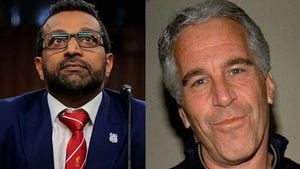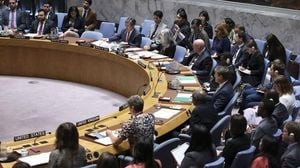In a dramatic escalation of partisan conflict, Texas Attorney General Ken Paxton and Senator John Cornyn have launched a multi-state legal and political campaign to force the return of over 50 Texas Democratic lawmakers who fled the state to block a controversial redistricting plan. The saga, which has unfolded over the past week, has seen civil arrest warrants, bomb threats, and even the involvement of the Federal Bureau of Investigation—raising alarms about the boundaries of state and federal power and the future of democratic norms in America.
The standoff began on August 7, 2025, when more than 50 Texas Democratic legislators left for Illinois, Massachusetts, and New York. Their goal: to deny the Republican-controlled Texas House the quorum necessary to pass a new congressional map that would grant the GOP at least five additional seats in the 2026 elections. According to reporting by Common Dreams and Above the Law, the Texas House requires 100 of its 150 members to be present to conduct business. With the Democrats gone, Republicans were left unable to proceed.
Unwilling to concede defeat, Texas House Republicans issued civil arrest warrants for the absent Democrats—actions permitted under Texas House rules but enforceable only within state lines. As Above the Law explains, these so-called "quorum warrants" empower the House's sergeant-at-arms to compel attendance, but only within Texas. That's why the Democrats fled the state, seeking refuge in Illinois and beyond.
Attorney General Paxton, a prominent Republican and 2026 senatorial hopeful, quickly moved to escalate the conflict. On August 8, he filed suit in Adams County, Illinois—far from the Democratic stronghold of Chicago—asking a state trial court to initiate contempt proceedings against the lawmakers. Paxton argued that the Full Faith and Credit Clause of the U.S. Constitution required Illinois to enforce the Texas House's civil warrants, treating them as "public Acts." In his words, "If the Quorum Order and Quorum Warrants are not given full faith and credit and are not enforced in Illinois, Texas is threatened with immediate and irreparable harm for which damages are an insufficient remedy."
Legal experts, however, were quick to point out the flaws in Paxton's argument. As Above the Law notes, the Full Faith and Credit Clause has historically been used to enforce valid court judgments, not legislative acts or internal procedural orders. The Texas House's warrants are not judicial orders, nor do they carry the force of law outside Texas. Critics accused Paxton of overreaching and misunderstanding the limits of his authority—an accusation that has dogged him in other high-profile disputes, including his threats against out-of-state doctors providing abortion or gender-affirming care to Texas residents.
Meanwhile, Senator John Cornyn, a longtime rival of Paxton, sought to up the ante. On August 7, Cornyn announced that FBI Director Kash Patel had approved his request for the bureau to assist state and local law enforcement in "locating runaway Texas House Democrats." In a statement reported by Common Dreams, Cornyn declared, "I thank President Trump and Director Patel for supporting and swiftly acting on my call for the federal government to hold these supposed lawmakers accountable for fleeing Texas. We cannot allow these rogue legislators to avoid their constitutional responsibilities."
The specifics of the FBI's involvement remain murky. Cornyn's office has declined to provide details, and the bureau itself has not publicly commented. As of the morning of August 7, no federal agents had been spotted at the Democrats' hotel in St. Charles, Illinois, according to The New York Times. Nonetheless, the mere prospect of federal law enforcement being deployed against state elected officials sent shockwaves through the political landscape.
Progressive advocacy groups and Democratic officials were quick to condemn the move. Christina Harvey, executive director of Stand Up America, warned, "The idea that the FBI would be weaponized to hunt down democratically elected lawmakers because they are standing in the way of President Trump’s partisan political agenda should alarm every American." Public Citizen echoed these concerns, stating, "When politicians deploy federal law enforcement against state elected officials simply for opposing their agenda, they attack our system and put our American freedoms at risk."
Illinois Governor JB Pritzker, speaking to News Not Noise on August 6 or 7, dismissed the legality of Cornyn's request. "There literally is no federal law applicable to this situation—none. They can say that they’re sending FBI. FBI agents might show up just to—I don’t know—again, to put a show on," Pritzker remarked. He assured the public that Illinois law enforcement would protect everyone within the state, including the Texas legislators, and insisted that without a federal crime, "there’s no way that our state legislators here—the Texas state legislators—can be arrested."
New York Governor Kathy Hochul joined the chorus of critics on August 8, publicly rejecting the notion that the FBI should be involved. Speaking on MSNBC’s "The Weeknight," Hochul said, "I have a lot of respect for the FBI, but I guarantee there are far more important pursuits that they should be engaging in, like human trafficking, breaking up drug cartels, stopping terrorist attacks here in New York City." She labeled the Republican request an "abuse of the power of the FBI" and warned, "If we’ve fallen that far, that makes our fight even more important—that all people stand up and say, ‘We’re not going to let you take away our democracy, and you’re not going to hunt down our elected officials.’" Hochul also vowed that Democrats would "fight fire with fire" if Republicans persisted with their redistricting efforts, emphasizing the need to stand up for democratic principles.
The redistricting battle itself has continued to intensify. On August 7, the Texas Senate Special Committee on Congressional Redistricting advanced the new map, setting the stage for a fierce contest in 2026. The episode has also generated threats of violence: early on August 6, a bomb threat forced the evacuation of a hotel in the Chicago suburbs where some Texas Democrats were staying. Fortunately, all members were safe, and Kendall Scudder, chair of the Texas Democratic Party, declared, "It’s going to take more than a couple of threats to try to scare Texas Democrats off of this course. It is essential to us and what we believe as Democrats that people deserve representation in our government, and we are moving full steam ahead."
Back in Washington, Democratic lawmakers such as Rep. Jamie Raskin have begun investigating the FBI's potential involvement and have urged the agency to stay out of the matter. The situation remains fluid, with no clear resolution in sight and both sides digging in for a prolonged battle over the future of Texas—and perhaps American—democracy.
As the dust settles on this extraordinary confrontation, the nation is left grappling with profound questions about the use of state and federal power, the boundaries of protest, and the health of its political institutions. The outcome will likely reverberate far beyond Texas, shaping debates over democracy, accountability, and the rule of law for years to come.





